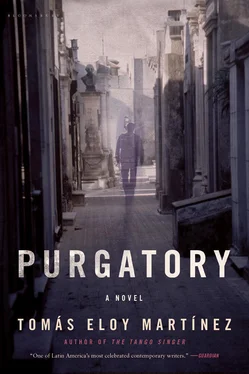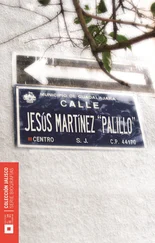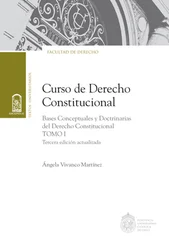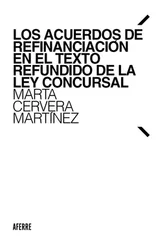José came to see him a week later. ‘We’re exhausted,’ he said. ‘We’ve been to Victoria, to Carapachay, to the railway works in Remedios de Escalada, and having failed there, we tried our luck in Córdoba. We were turned away everywhere we went. The place where they treated us best was a filthy dive bar — they gave us food, rancid cheese and stale bread. There were two drunks in the bar who made fun of María. “So you’re going to give birth on the 24th, on Christmas Eve? Who do you think you are, the Virgin? I could easily believe you’re a virgin, you fat fuck. Get out of here.” María, who’s a devout Catholic, said, “God forgive you, how could you take me for Our Lady?” and that’s when things went sour. I couldn’t convince her to stay. I finished the article myself and have brought it to you, Doctor, just to fulfil our obligations.’ ‘Does the article explain everything exactly as it happened?’ asked Dupuy. ‘Word for word,’ said José. ‘Neither of you understands anything. Go back and write it again. Write about people being helpful, say they invited you to eat with them, offered you work, gave you clothes for the baby. I’ve already earmarked seven pages in the magazine for the piece. Just because you failed in reality doesn’t mean I have to fail.’
One of the admiral’s henchmen had infiltrated the Mothers of the Plaza de Mayo. It was at a meeting in the Church of Santa Cruz and as he left he kidnapped one of the mothers and two French nuns. The following day, the papers said that the Montoneros had claimed responsibility for the kidnappings and were demanding ‘the release of 21 subversive delinquents’ for the safe return of the hostages. It sounded like one of Dupuy’s ruses, but the doctor was insulted that these copycats had been so sloppy in their work. He put in a furious call to the admiral. ‘What idiot came up with the idea that the Montoneros would refer to their own comrades as delinquents?’
Did he have to do everything himself? Unless he was absolutely meticulous, even his best plans seemed foolish. In a speech he had not had the opportunity to read, the Eel rashly admitted that there were four thousand extremist prisoners. He spoke without thinking, that’s far too many, thought Dupuy. He wrote the script for a fake documentary showing military operations against subversive troops who were launching attacks on the northern border using Soviet-issue missiles and mortars. In the film, they would be repelled by the military and mown down on the battlefield. National cinema had already created battles in Savage Pampas and The Gaucho War which people still remembered. It would cost nothing to breathe new life into epics like this and use them to justify the four thousand dead. He took the plan to the admiral, who was against the idea. ‘Forget about the Montoneros, Doc. We don’t need them any more. We need to show the people that Argentina has enemies with bigger firepower, ruthless despots determined to steal parts of the country from us.’ ‘Stroessner?’ Dupuy ventured. ‘How could you think such a thing?’ said the admiral. ‘The President of Paraguay is an ally. I was thinking of someone less cunning. A brute like Pinochet, for instance. The Argentine people don’t like him, and the Chileans will be a pushover.’
Welles, thought Dupuy, had not been so wrong after all. The people of Argentina will believe what they’re told and the newspapers and the radio will say what they’re told to say. Even an illiterate like Pol Pot has almost succeeded in creating the reverse situation in Cambodia: a Communist peasant society. What’s stopping us from marching forward on our crusade (he loved the word crusade ), doing the same thing, but under the banner of the one true God?
Welles had made a deeper impression on him than he had realised. His editorials in La República were no longer starchy analytical articles where military chiefs and businessmen could read between the lines. He now rarely quoted Descartes, Leibniz and St Augustine, preferring Eliphas Lévi and Madame Blavatsky. He did not mention Horangel’s 20astrological predictions, though he read them. He talked about symbolism, about the influence of the stars, the relationship between numbers and letters, and, which was more astonishing, even the comandantes took his economic predictions seriously.
Alone in the house, Emilia wandered through the rooms where the things her mother had left behind were fading, the cane, the bed jacket she wore when she got up, the bedpan, the television with its still-flickering grey images. She visited her at the old people’s home twice a week and every time she left her mother sitting out on the terrace with the other old people she was racked with guilt. As a teenager she had been fascinated by the things she didn’t know and drew maps as though she were writing poems: maps of imaginary cities that existed only in books, or of countries wiped away by the dust of history. Now, none of this mattered: as an adult, she had moved from one disenchantment to the next. She spent her days between itinerant maps which disappeared even before they were fully formed.
When the nurses brought her mother out onto the terrace, Emilia would stroke her hair and tell her stories. She talked to her about the first time she had met Simón in the cellar bar where Almendra were playing songs that now sounded dated, sang the lyrics to her in a voice so soft the nurse could not hear, recounted the plots of movies they had watched together and of which Emilia remembered only fleeting images. She talked to her as she might to a doll, or to the daughter she had never had. And as she talked, she stroked her hands while her mother stared into the distance with her beatific Mona Lisa smile. Sometimes, she seemed to wake up, she would echo ‘Ah yes, Simón, your Simón’, but they were just sounds, like the first babblings of a baby. She was wasting away, if it were possible for an old woman who was already no more than a shadow of herself to waste away.
One of the doctors advised Emilia to take Ethel back to the family home from time to time. He explained that sleeping in their own bed, being in a familiar place surrounded by people who love them, could work miracles for people suffering from mental illness. ‘There’s no chance that she will ever be who she used to be,’ said the doctor, ‘the damage is irreversible, but if anything is going to help her, it’s love.’
‘ Baruch atah Adonai ,’ muttered Ethel.
‘Blessed is the Lord,’ translated the doctor. ‘Your mother is a very religious person. She repeats that prayer several times a day.’
‘That’s not the way she used to pray. Could she have converted?’
‘How could she have? She’s in no fit state. She calls on God the only way she knows how, the way she remembers.’
‘Taking her home would create problems. We’ve given away most of her clothes. My sister is about to get married. I’m out working all day and so is my father.’
‘Think about it, discuss it among yourselves. Three days, maybe a week every now and then would be enough. And don’t worry about the clothes, she doesn’t need much.’
That night, Emilia raised the subject with her father and Chela who let out a scream. ‘Who is this doctor? Is he crazy? Has everyone gone crazy? Didn’t you tell him that I’m getting married and that if she’s here it’ll be a disaster?’
Her father considered the idea. He dropped by the sanatorium only rarely, claiming that it upset him to see the ruined shell that was the woman to whom he had given his name. He asked if they bathed her every day, whether they were feeding her properly, then he left. She had never heard him say a loving word. He loathed expressions of affection, or maybe (thought Emilia), he used them only when saying things he did not truly believe.
Читать дальше












